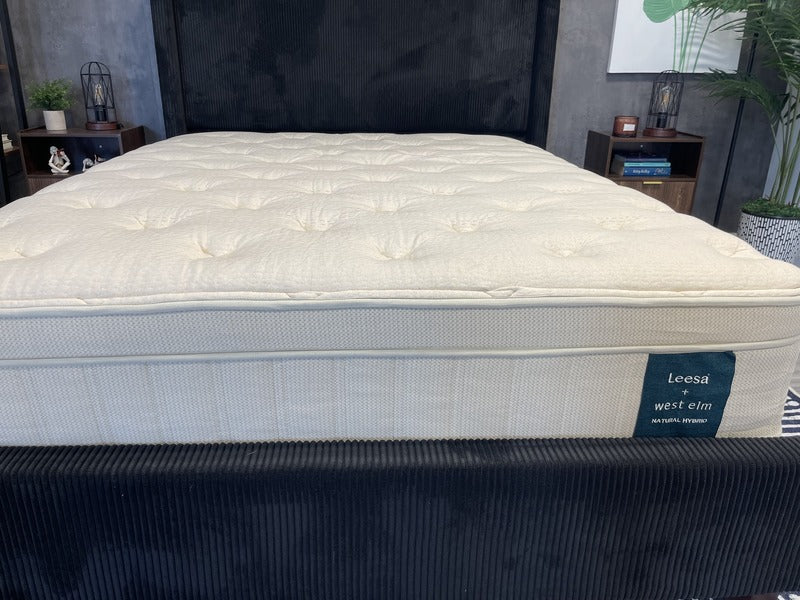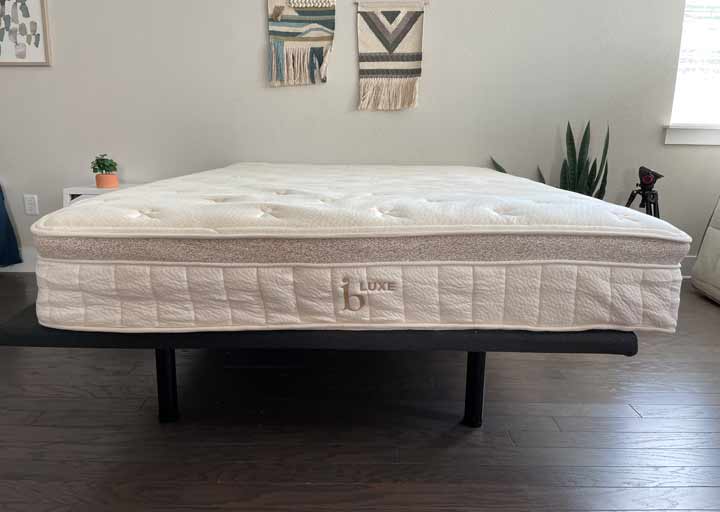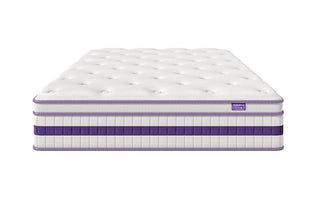Best Organic Mattress
We receive free products to review and participate in affiliate programs, where we are compensated for items purchased through links from our site. See our disclosure page for more information.
If you have allergies or simply prefer clean, natural materials, an organic mattress can enhance your sleep experience. Each mattress on this list is crafted with sustainability, wellness, and durability in mind, using eco-friendly materials that are gentle on your body and kind to the planet.
These options impressed our in-house team of mattress experts and certified sleep science coaches during hands-on tests for comfort and durability. Additionally, because sleep is a crucial component of overall health, we collaborated closely with our chief medical advisor, Dr. Raj Dasgupta, MD, FACP, FCCP, FAASM, to ensure our recommendations align with the latest research in sleep medicine.
Read on to discover which models excelled in testing and find the perfect organic mattress for your sleep style.
Editor’s Note: The information in this article is not intended as a substitute for medical advice. Please consult a healthcare professional if you have specific health-related concerns.
Our Verdict: What’s the Best Organic Mattress?
The Leesa Natural is our top pick for the best organic mattress, thanks to its outstanding balance of comfort, sustainability, and performance. This mattress scored 4/5 or higher in every testing category, impressing our team with exceptional cooling and motion isolation—qualities that are rare for a latex hybrid. Its GOLS- and GREENGUARD Gold-certified materials, including sustainably sourced latex and moisture-wicking New Zealand wool, create a breathable, chemical-free sleep surface.
The Best Organic Mattresses
- Leesa Natural – Best Organic Mattress Overall
- Nolah Natural – Best Organic Mattress for Side Sleepers
- Saatva Mattress – Best Organic Hybrid Mattress
- WinkBeds Mattress – Best Organic Mattress for Combination Sleepers
- Birch Mattress – Best Organic Luxury Mattress
- Avocado Eco Organic – Best Organic Mattress for Couples
- PlushBeds Botanical Bliss – Best Organic Mattress for Back Sleepers
How We Tested and Selected the Mattresses
Compare the Best Organic Mattresses
Leesa Natural – Best Organic Mattress Overall

Nolah Natural – Best Organic Mattress for Side Sleepers

Saatva Classic – Best Organic Hybrid Mattress

WinkBed Mattress – Best Organic Mattress for Combination Sleepers

Birch Mattress – Best Organic Luxury Mattress

Avocado Mattress – Best Organic Mattress for Couples

PlushBeds Mattress – Best Organic Mattress for Back Sleepers

PlushBeds Botanical Bliss
Other Organic Mattresses We Researched
While these mattresses didn’t claim the top spots, they still stood out for their high-quality materials and solid overall performance. Here’s why they came close—and what set our winners apart:
- Birch Mattress – The original Birch Natural mattress is a great organic option, featuring many of the same all-natural materials as its Luxe counterpart. However, I chose the Birch Luxe Natural for its superior pressure relief and edge support, which offer better long-term comfort and durability.
- Zenhaven – The Zenhaven by Saatva is an impressive organic mattress that performed well in our responsiveness and edge support tests. However, I ultimately selected the Saatva Latex Hybrid due to its soft, mattress topper cover, which is likely to appeal more to sleepers who prefer a cushioned sleep surface.
How We Tested these Organic Mattresses
We evaluated each model through a series of hands-on performance tests that simulate real-world sleeping conditions to identify the best certified organic mattresses. Our in-house mattress testers focused on key factors that most impact comfort, support, and sustainability.
Edge Support
Edge supportrefers to how well a mattress holds its shape and stability along the perimeter when you sit or lie near the edge. A sturdy perimeter lets sleepers use the full surface area of the bed without feeling like they might roll off. Edge support is an essential consideration for couples who share space, people with larger body types, and those with limited mobility who rely on the edge for balance when getting in or out of bed.

A mattress with a reinforced perimeter is generally more durable, which is especially true for mattresses made primarily from organic materials.
As Dr. Dasgupta explains, "A durable and supportive mattress perimeter is a good indicator that it will maintain its quality over time. A mattress with corner-to-corner support is less likely to sag over time."
To evaluate edge support, our testers sit and lie along the sides of the mattress to assess its stability and compression. We also place three stacks of weights on the edge to simulate the pressure from lightweight, average-weight, and heavyweight sleepers. This approach allows us to measure how well each mattress holds its structure under various types of pressure.
Responsiveness
Responsivenessrefers to how quickly a mattress adjusts and bounces back when pressure is applied. A responsive surface allows sleepers to change positions easily without feeling trapped in the layers of the bed. Snappy responsiveness is especially beneficial for combination sleepers who shift frequently during the night and for couples who need a mattress that adapts quickly to shared movement.



Dunlop and Talalay latex, commonly used in organic mattresses, are naturally buoyant and elastic, providing a lively, springy feel. This quality helps prevent excessive sinking, making it easier to stay supported and aligned throughout the night.
To assess responsiveness, our testers apply pressure to different areas of the mattress and observe how quickly it returns to its original shape. We also move across the surface to evaluate how easily the mattress adapts to shifts in position.
Materials and Certifications

The materials used in an organic mattress are crucial to its comfort and durability. The models on this list feature organic latex, cotton, and wool—materials known for their durability, temperature-regulating properties, and lack of synthetic additives. These high-quality components not only enhance comfort but also reduce exposure to harmful chemicals found in conventional foams and fabrics.
Additionally, third-party certifications verify that these materials meet strict environmental and safety standards. We prioritized certifications like GOLS, GOTS, and GREENGUARD Gold, which ensure that the latex and textiles are responsibly sourced, non-toxic, and low in chemical emissions. Every mattress on this list holds at least one certification from an independent organization.
What Else Is Important When Buying an Organic Mattress?
Beyond certifications and materials, several personal factors impact the comfort and longevity of your organic mattress. Considering factors like your body weight, sleeping position, and even the brand’s trial and warranty policies can help ensure you make a purchase that suits your needs and lasts for years.
Body Weight and Preferred Sleeping Position
Your body weight and sleep position play a significant role in how your mattress feels and performs over time. Sleepers over 230 pounds tend to put more pressure on the mattress surface, which can cause faster wear and sagging, especially in softer or low-density foam models. Firm mattresses with reinforced coils or resilient latex cores generally provide better long-term support and help prevent excessive sinkage.
On the flip side, sleepers under 130 pounds don’t compress the mattress as much and may find extra-firm beds too rigid for comfort. Medium or medium-soft models typically offer the right balance of cushioning and support for smaller frames.
Sleeping position also makes a difference. According to Dr. Dasgupta, back and stomach sleepers generally need a medium-firm to firm surface that keeps the spine aligned and prevents the hips from dipping, which can lead to lower back pain. Side sleepers, however, benefit from more contouring around the shoulders and hips. The best mattresses for side sleepers combine plush comfort layers with a stable support core that resists sagging while maintaining proper alignment.
Sleep Trial and Warranty
Organic mattresses are typically more expensive due to their high-quality, sustainably sourced materials, making it crucial to select a brand that stands behind its product. A generous sleep trial (usually ranging from 100 nights to a full year) allows you to test the mattress in your home and ensure it meets your comfort and support needs before committing long-term.
The warranty is equally important. It's best to choose a mattress with at least a 10-year warranty (or longer). A strong warranty demonstrates the manufacturer’s confidence in the mattress’s durability and the quality of its natural materials.
Before making your purchase, be sure to review the brand’s return and exchange policies to understand what happens if the mattress doesn’t meet your expectations or needs.
Best Organic Mattress FAQs
References
- US EPA. “What Are Volatile Organic Compounds (VOCs)?” US EPA, 19 Feb. 2019, www.epa.gov/indoor-air-quality-iaq/what-are-volatile-organic-compounds-vocs.
- National Institute of Environmental Health Sciences. “Flame Retardants.” National Institute of Environmental Health Sciences, 8 Feb. 2024, www.niehs.nih.gov/health/topics/agents/flame_retardants.
























